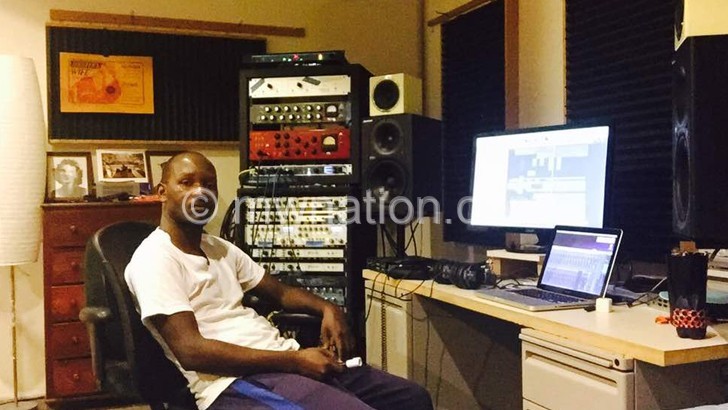African fiddle fussion
In in 2002 while studying mechanical engineering, Peter Mawanga recorded a playful album that set him on the path to his musical destiny.
Recorded under the name Peter Pine, City Life was a sensation across Malawi. The afro-pop album’s controversial hit single Amakhala ku Blantyre became an instant hit as a result of the debate it generated.
It was controversially brutal as it discussed the realities of urban versus rural living, especially for those based in the commercial city of Malawi.
The song was so controversial it inspired several ‘response’ songs, which opposed Peter’s shattering of the ‘city streets are paved with gold’ myth. Buoyed by the overnight success of his first album and lack of funds for his college tuition, Peter abandoned his studies for a professional music career.
That’s all Peter Mawanga needed to launch his music career.
Amakhala Ku Blantyre not only catapulted him to success, but launched an industrious journey that has seen the artist dropping four albums; City Life, which had the famous track, Zanga Zo Zama, which has the Tsoka Song, Paphiri ndi Padambo, the collection that has Sungani Mwambo and Mawu A Malawi, his first ever international collaboration.
Since then, Mawanga as the artist is fondly known after shedding the Peter Pine moniker, has been creating definitive music; globally recognised yet intrinsically Malawian.
He is back with a new album Nyanja Vibes promising to remain to the core of his Afro melodies—a fusion of traditional African rhythms, vocal arrangements and composition.
The previous albums have seen Mawanga fusing all that concoction with modern instrumentation and inspirational beats. With the forthcoming album, the artist has taken a different path.
“This is a folk and very traditional acoustic album. It comes after a research I did across Malawi discovering traditional instruments. I did recordings of different traditional instruments and sounds in all regions of the country.
“These sounds replaced all modern instruments with traditional ones. I used batcha in place of kick drum, keyboard was replaced with mangolongondo. I also have sansi, kora visekese and maseche in all the songs,” said Mawanga in an interview.
To bring out the best of the collection, the artist went an extra mile in enlisting the award-winning hands of an engineer. Plans are also underway to go global with it.
“The album was recorded in United States [US] after my 2017 tour. I and Alfred Sitolo Nkhoma who played most of the guitars, camped for two weeks and recorded it. I did the traditional instruments and vocals plus producing. The album has been mixed in US by Jim Robeson, a Grammy award winning sound engineer.
“I am returning to the US and this trip, among others, will be a pre-promotion tour for the new album. It will be released on all online platforms like iTunes, Googleplay and Amazon by April and plan to launch in Malawi in May. After the release, I plan to have a world tour launch with gigs in UK, US, Zimbabwe, Zambia, most likely Japan and South Africa,” he stated.
Dubbed African Fiddle of Fusion, Mawanga tours the US from February 17 to March 4.
“It’s going to be 11 shows in five States; Pennsylvania, Washington DC, Virginia, New York and West Virginia. I will be doing a duet performance with Andrew Finn Magill, the fiddler, I worked with on a project that musically captures 11 experiences and stories of HIV and Aids [Mawu A Malawi album],” explains the artist.
On this tour, Mawanga is travelling without a band. He will play a guitar and Sansi while Finn will be on violin.
“We are stripping out the bands and, therefore, will do an acoustic set just the two of us. This will be the fourth time for me in the US for shows. The difference this time is that it will be more intimate as we are trying to have a close encounter with the audience. We have selected venues where we can have an intimate setting as opposed to big halls and festivals in the past.
“Aside that, it will also be the beginning of the writing process of our collaboration album, a follow up to Mawu a Malawi. Again, it is a good opportunity for me to talk more about Malawi, sell my new album and my label, Amaravi; a proper clothing using Chitenje material,” explained the artist.
Being his first time working with an African, Robeson cherishes the moment he met and decided to work with Mawanga.
“I love the album. Peter did a great job of recording the album and gave me good material to work with and help Peter attain his vision of the album. Peter was the first Malawian to work with and truly an exciting and fun project it is. I have not worked with any other African artists. I would be thrilled to even given the opportunity,” he explained.
At times money is not the motivation. So what influenced the award-winning engineer to work with, an artist from a not-so-famous-country musically?
“I didn’t need any convincing. Peter reached out to me and we talked about what his vision was and well, what can I say? I wanted to be part of Peter’s project. We quickly found we were a good team.
“If I wanted to try something a little different, Peter was always open to it. I hope and look forward to working on future projects with Peter.
“Unfortunately, I haven’ had a chance to listen to any other Malawian music,” he explained.
One word to describe Nyanja Vibes according to Robeson, “It’s alive!”





